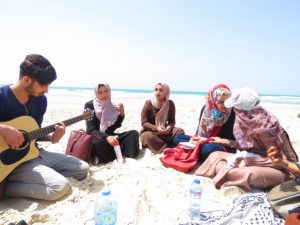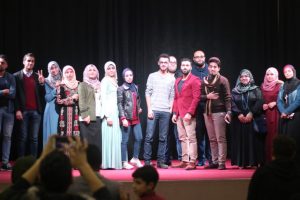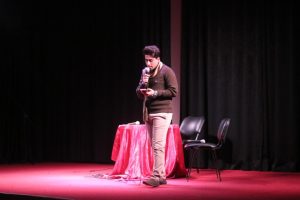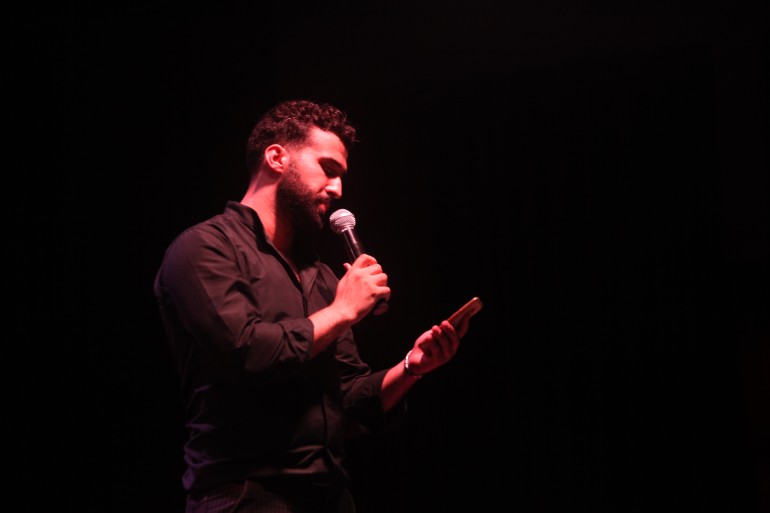’
Mohammed Moussa performs poetry during Gaza Youth Speaks, the first spoken word event in Gaza, in July 2018. More than 25 participants performed poetry in English and Arabic [Photo courtesy of Mohammed Moussa]
By Mohammed Moussa Published On 8 Jun 2021 in Al Jazeera
Children eagerly thumbing through books in the kids section, youngsters scanning the covers, undergraduates searching for a quiet spot to work, others drinking their coffee as they read. The smell of incense. The piles of books. The yellow banner bearing the name Samir Mansour – the library and bookstore that was home to Gaza’s most passionate readers.
I was a student of English literature – searching out novels, poetry collections, books from around the world – when I found it, directed there by friends who knew I would find what I was looking for.
The first time I entered, I marvelled at its tens of thousands of books and left with a poetry collection by the late Palestinian poet Mahmoud Darwish and a Russian novel that had been translated into Arabic. It was the largest bookstore in Gaza. Now just a few books remain – among them Ghassan Kanafani’s novel Returning to Haifa – the story of a Palestinian couple who goes back to Haifa after the 1967 war to look for their baby, whom they were forced to leave behind in the war of 1948 (Nakba). How did that book survive all the flames and all the smoke to tickle our blazing yearning for our missing homeland and our missing Haifa?
I woke up to the news on May 18. That morning, at 5:50am – the crack of dawn – the bookstore had been hit by an Israeli missile. My memory filled with the faces of friends I’d been there with, with the titles and covers of the books I’d read or bought from there. Our books were burning, our memories too. Our most vital places were being wiped out.
I wrote my first poem in 2014, as Israeli bombs rained down on Gaza, sitting in the corner of my room during the three hours of electricity we had each day, listening to the radio and to the sound of bombs, drones and ambulances. I typed out the words – “I was born in Gaza.” I wanted to talk about what I was going through in the tune of a poet or a poetry lover. When the poem was finished, I posted it on social media. The next day, I found an enormous number of likes and shares; my message had been delivered.
Growing up in Gaza is inspiring for anyone, but especially for poets – life here is poetry blown into pieces and scattered all over the place. In the weddings, there’s poetry, in times of war, in the eyes of an old man sitting in front of his small shop, mourning the death of his child, in the tears of a lover whose fiancée was murdered along with her entire family while she was sleeping in her house, in the blueness of Gaza’s shores, which carries me to where I want to be and brings me back to who I was, in the flames of bombs falling on the heads of Gazans; heartachingly and heartwarmingly, this place can definitely make you a poet.
In 2018, I created the first spoken word community in Gaza, Gaza Poets Society. It’s a community of young and aspiring poets – almost 30 of us in total – who gather to exchange ideas, share our work and connect with other poets in other parts of the world. We once gathered on the beach to share poetry and songs.
For us poets, watching Israel target Samir Mansour and other cultural and educational centres was difficult. I asked some of them to share their feelings.

Poets gather on the beach in Gaza, sharing poems and singing songs [Photo courtesy of Mohammed Moussa]
Nadine Murtaja, 18: ‘We walk on the shattered glass of our broken windows, we walk on stones that once were a house’
When I reached out to Nadine – who is a member of the Gaza Poets Society – over Facebook to ask her how she was feeling, she answered “still alive”.
For the 18-year-old from the al-Nasr neighbourhood in central Gaza, writing poetry is an escape valve during times of war.
“Two years ago, I found that I am really into poetry,” she explains. “After that realisation, everything I encounter in my life I document on paper; my tears, and shouts form my poems. Just like that, writing poetry becomes an escape for me – a world of my own, far away from the world I live in.”
She writes even when “the flames of war are blazing”.
During the most recent Israeli assault on Gaza, she wrote this:
“There, on the other side,
time changes, hours pass, and it gets darker,
the sky takes off its dim dress, then the morning arrives,
but here where I live, and breathe, life wears its black dress constantly,
to mourn the labour of my land,
which took a long time.
Here, the hanging clock, in my room is broken,
not only this one, everyone’s clock is broken here,
my mother keeps saying:
everyone is waiting for the elixir,
we’ve had it with the grief and agony,
in this holy land we sleep and wake up on the sound of bombing and shooting
so the first light of day rises in the evening,
lighting up the sky with the blood of martyrs,
here death sleeps not far from us,
we all walk towards freedom, towards hope,
we walk on the shattered glass of our broken windows,
we walk on stones that once were a house, carrying stories and secrets,
we walk with the screams of children, and the groans of mothers pulsating over and over in our ears.”
Nadine describes herself as “kind of a discreet person, who finds it hard speaking about what she feels or experiences to those around her”. She wonders whether that is why her poems are “vibrant, realistic and poignant”.
Her favourite poet, she says, is Mahmoud Darwish – the Palestinian poet who was born in 1941 and died in 2008 and who generations of Palestinians have grown up reading in school books and on murals painted on the walls of refugee camps, his words forming part of the Palestinian conscience.
“Every time I read his poetry, I find myself immersed in his words,” Nadine explains. “I’ve always wanted to dig deeper when I write my poetry as he did. Also, I like how he mixed reality with his emotions to make his poetry so powerful.”
Nadine believes living in Gaza has contributed to making her the poet she is today but says: “Writing cannot be impacted by circumstances, because no matter what the poet goes through, he or she will always run to their own world – which is writing”.
Her message to the world is: “Even if Palestine isn’t your national or political issue, don’t forget that it is a human issue in the first place”.

A group photo at the Hymns of Peace spoken word event in Gaza in November 2018 [Photo courtesy of Mohammed Moussa]
Maha Jaraba, 22: ‘There is just a small window for light to get through’
“There is no outlet in Gaza but poetry, it is the only medium that takes our souls wherever we want to go,” says 22-year-old Maha Jaraba, who is from the al-Nusairat refugee camp in Deir al-Balah in central Gaza. The overcrowded camp is home to more than 80,000 people – those who fled during the Nakba in 1948 and their descendants. Maha studies Business Administration at Al-Quds University and is a member of the Gaza Poets Society.
“We are in the midst of dark, in the midst of bleakness, there is just a small window for light to get through, into our chests, and to release our sense of outrage or to get rid of the stumbling blocks there is only writing poetry,” she says.
Everything that surrounds Maha inspires her to write – poetry is the only way she can feel free in Gaza, she says.
“I don’t think I’d be a poet if I was born in a city other than Gaza, the darkest and bleakest life only exists here. The troubles we face, or the emotions that live inside us, do not exist anywhere else. And those feelings are what made us poets,” she reflects.
She refuses to stay silent about the hardships and brutality Palestinians endure – the continuous attacks on Gaza, living under siege, being stripped of basic rights, children being murdered. She believes the international community is turning a deaf ear to Palestinians but she will not be silenced.
“The only thing that relieves us from the troubles of war is poetry. As bombs fall, I write. While learning of the death of my people, I still write,” she says.
The last poem Maha wrote was a free-verse poem, expressing how terrified she is of being blown to pieces, of dying in pieces, of not even being able to say goodbye to loved ones because they can no longer be identified. She was sitting in her family’s home as she wrote it, all her relatives together in one room, listening to the sound of bombs falling as she typed. She thought it might be her last poem. “It crossed my mind to escape, to the shelter of life, which hasn’t become a life, today I am here, tomorrow I’ll be there, and fear is between me and what I will be,” she wrote.
“Writing is the life we miss, and Gaza is what made us poets, it is what made us pen tearful poems, writing is the only free medicine in this city,” she says.
When asked what her message is to the world, she replies: “I want the world to know we are here, that we have dreams. We want a better tomorrow, not only to take our share of pain, but also to take our share of life.”

A poet performs at the Hymns of Peace spoken word event in November 2018 [Photo courtesy of Mohammed Moussa]
Omar Moussa, 23: ‘I think destiny is the one who’s writing me a poem’
The whites of his eyes take the last form,
Then they dribble and take the paper shape.
With bullets; he smashes the mouth of the warplanes –
and plucks out the tusks of killing and destruction.
With bullets;
he demolishes the borders of siege:
and the walls of the world which is slumping over
in its selfishness.
With bullets and blood; he draws a free homeland
and a long and edgeless coastline
to fail memories to slumber.
Omar Moussa
Omar Moussa is a 23-year-old poet, journalist and member of the Gaza Poets Society who lives in Jabalia Camp, the largest refugee camp in Gaza.
“Usually, literary writing, with its different forms, opens a window for us that allows us to breathe especially when it comes to speaking about what is going on inside us, like you think and I think, and when you write it down, it feels like we loosen up,” Omar says.
Omar believes there is no way to escape a place like Gaza, even by writing poetry. “If we see poetry as a gate to escape Gaza, that would seem a luxury that the people of Gaza don’t have. Reality is reality – you just cannot skip that, and writing poetry is just to swindle this reality. Here, there is death, rubble, and a tiny little life, but amidst the concretions of reality there is a flower growing, and it is the flower of poetry.”
To Omar, poetry is an attempt to translate oneself, to break down reality or to create a reality apart from the one we live in.
His favourite poets are Mahmoud Darwish, Chilean poet Pablo Neruda (1904-1973), and Egyptian poets Amal Dunqul (1940-1983) and Ahmed Bakheet. “For no reason in particular, you find yourself interested in a specific type of poetry and not interested in others,” he says.
When I ask Omar if he hopes his poetry will reach people outside Gaza, he answers: “Maybe they read my poetry, but all I have to do is write. If I want to send a message to the outside world, I would say: ‘There are those who are living in spite of all the death around us.’”
As to whether he writes during wartime, he reflects: “I think destiny is the one who’s writing me a poem – [whether] it is a poem of death or a poem of life, all I do during this time is [try to] survive the lava of aggression.”
Mohammed Moussa is a Palestinian freelance journalist, podcast host, and the founder of Gaza Poets Society. He recently published his debut poetry collection Flamingo.




















































